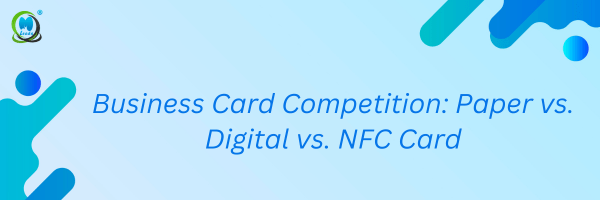Introduction
In today’s fast-paced digital world, the battle between traditional and modern approaches extends to even the most fundamental aspects of business communication. One such battleground is the realm of business cards, where the traditional paper format clashes with the digital and near field communication (NFC) alternatives. This article delves into the business card competition, exploring the pros and cons of paper, digital, and NFC cards to help you make an informed decision for your professional needs.
Business Card Competition: Paper vs. Digital vs. NFC
In the era of smartphones and instant connectivity, it’s essential to examine the different options available for exchanging contact information. Let’s analyze the paper, digital, and NFC business card formats and their impact on networking, convenience, aesthetics, and sustainability.
Paper Business Cards: Classic Charm or Outdated Relic?
The enduring popularity of paper business cards is a testament to their timeless charm. They have long been an essential tool for networking and making memorable first impressions. However, are paper cards still relevant in the digital age?
- Tactile Appeal: Paper cards offer a tangible and tactile experience that digital alternatives struggle to replicate. The texture, weight, and design of a well-crafted paper card can leave a lasting impression on recipients.
- Personal Touch: Paper business cards allow for personalization and customization, reflecting the unique identity of the individual or the brand. The design possibilities are endless, making it easier to stand out in a sea of digital profiles.
- Ease of Use: Paper cards are simple to distribute, requiring no additional technology or connectivity. They can be handed out during face-to-face meetings, networking events, or even left at strategic locations for potential clients to discover.
However, paper cards also have their limitations in today’s digital world.
Digital Business Cards: Conveying Contact Information in the Digital Realm
- Versatility: Digital business cards provide a versatile solution for professionals who prioritize accessibility and convenience. They can be shared instantly via email, text messages, social media, or even through specialized apps.
- Multimedia Integration: Unlike their paper counterparts, digital cards offer opportunities for multimedia integration. This means you can include videos, links to portfolios, or interactive elements that showcase your skills and work samples.
- Sustainability: Going digital means reducing paper waste, making it an environmentally friendly choice. With digital cards, you can contribute to sustainability efforts and align your brand with eco-conscious practices.
However, digital cards also have their drawbacks.
NFC Business Cards: Contactless Connectivity and Cutting-Edge Technology
- Seamless Exchange: NFC business cards leverage near field communication technology to enable seamless contact exchange between devices. By simply tapping two compatible devices together, contact details can be instantly transferred.
- Tech-Savvy Image: Adopting NFC technology showcases a forward-thinking approach and a willingness to embrace the latest innovations. This can enhance your professional image and make a memorable impression on tech-savvy contacts.
- Integration with Mobile Devices: NFC cards integrate effortlessly with smartphones, making it easy for recipients to save contact information directly to their address book. This eliminates the need for manual data entry and reduces the likelihood of losing or misplacing a paper card.
Nevertheless, NFC cards come with their own set of considerations.
FAQs
- Q: Are paper business cards still relevant in today’s digital age? A: While digital alternatives have gained prominence, paper business cards continue to hold their own due to their tactile appeal, personal touch, and ease of use.
- Q: How can digital business cards be shared? A: Digital business cards can be shared instantly through email, text messages, social media





Zaproxy dolore alias impedit expedita quisquam.